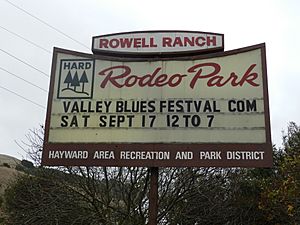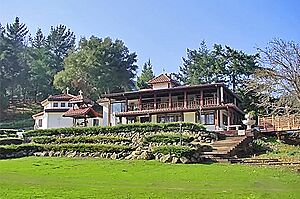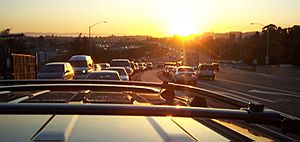Castro Valley, California facts for kids
Quick facts for kids
Castro Valley, California
|
|
|---|---|
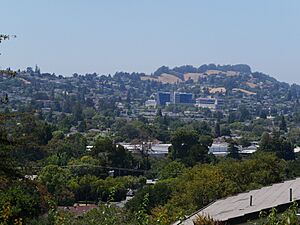
Castro Valley, 2022
|
|
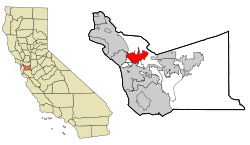
Location of Castro Valley within Alameda County, California
|
|
| Country | |
| State | |
| County | Alameda |
| Named for | Don Guillermo Castro |
| Area | |
| • Total | 17.07 sq mi (44.21 km2) |
| • Land | 16.85 sq mi (43.64 km2) |
| • Water | 0.22 sq mi (0.57 km2) 1.68% |
| Elevation | 161 ft (49 m) |
| Population
(2020)
|
|
| • Total | 66,441 |
| • Density | 3,943.55/sq mi (1,522.58/km2) |
| Time zone | UTC-8 (PST) |
| • Summer (DST) | UTC-7 (PDT) |
| ZIP codes |
94546, 94552, 94541,
|
| Area code(s) | 510, 341 |
| FIPS code | 06-11964 |
| GNIS feature IDs | 1658237, 2407987 |
Castro Valley is a community in Alameda County, California, United States. It's not an official city, but a "census-designated place" (CDP). This means it's a special area defined by the government for counting people. In 2020, about 66,441 people lived there.
The community is named after Don Guillermo Castro. He was a famous ranch owner in the 1800s. He owned the land where Castro Valley is today.
Contents
History of Castro Valley
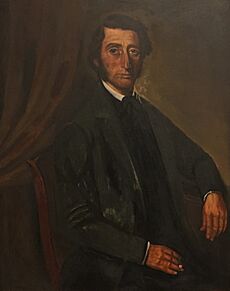
Long ago, before Europeans arrived, the area was home to the Chocheño people. They were a group of Ohlone Native Americans.
In 1797, Europeans built Mission San Jose nearby. The land that is now Castro Valley was part of a large area called New Spain. This was a colony of Spain in what was then Alta California.
In 1840, Guillermo Castro received a huge land grant called Rancho San Lorenzo. It was about 28,000 acres. This land included what are now Hayward, San Lorenzo, and Castro Valley. Castro had to sell parts of his land because of gambling debts. The last part was sold in 1864.
A man named Faxon Atherton bought the land. He then started selling it in smaller pieces. In 1866, the Redwood school was built. This was the first public school in the area. Many Portuguese families moved to the canyons nearby. They farmed large amounts of land. In the 1870s, Lake Chabot, a reservoir and park, was built.
During the 1940s and 1950s, Castro Valley was known for its chicken farms. Later, it became a "bedroom community." This means many people live there but travel to other towns for work.
Geography of Castro Valley
Lake Chabot is in the northwest part of Castro Valley. To the west is San Leandro. Hayward is to the south. To the east are Dublin, Pleasanton, and San Ramon.
The eastern hills of Castro Valley are where several creeks begin. These creeks flow into San Lorenzo Creek. Some of these are Bolinas, Castro Valley, Crow, Cull, and Palomares Creeks.
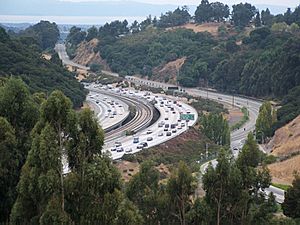
Population and People
| Historical population | |||
|---|---|---|---|
| Census | Pop. | %± | |
| 1940 | 4,145 | — | |
| 1960 | 37,120 | — | |
| 1970 | 44,760 | 20.6% | |
| 1980 | 44,011 | −1.7% | |
| 1990 | 48,619 | 10.5% | |
| 2000 | 57,292 | 17.8% | |
| 2010 | 61,388 | 7.1% | |
| 2020 | 66,441 | 8.2% | |
| U.S. Decennial Census | |||
In 2010, there were 61,388 people living in Castro Valley. Most people lived in homes. About 98% of the population lived in households.
The people living in Castro Valley came from many different backgrounds. About 58% were White, 21.4% were Asian, and 6.9% were African American. About 17.4% of the population was Hispanic or Latino.
The average age of people in Castro Valley in 2010 was about 41 years old. About 23.4% of the population was under 18 years old.
Economy and Jobs
Castro Valley's economy mainly provides goods and services for the people who live there. It's mostly a place where people live, with only a small part used for businesses.
Many people in Castro Valley work in healthcare and social assistance. This industry brings in a lot of money for the area. Other important jobs are in retail (stores) and food services (restaurants).
In 2019, the average household income in Castro Valley was about $108,488. This was higher than the average for all of Alameda County. A small number of people, about 6.9%, lived below the poverty line.
Arts and Culture
Castro Valley has a movie theater called the Chabot Cinema. The Castro Village complex is seen as the main shopping area in town.
The Harry Rowell Rodeo Ranch is in Castro Valley. Rodeos are held there regularly.
Historical Places
| Site of the first public school in Castro Valley | |
|---|---|
| Location | 19200 Redwood Rd., Castro Valley, California |
| Reference no. | 776 |
The site of the first public school in Castro Valley is a special historical landmark. A plaque marks the spot. The first school was a one-room building built in 1866. It burned down twice, in 1901 and 1920, and a new school was then built elsewhere.
The Adobe Art Gallery is a place that shows visual arts. It is in the Adobe building, which was built in 1936.
Education
Most adults in Castro Valley have graduated from high school. Many also have a bachelor's degree from college.
Public Schools
Most students in Castro Valley go to schools in the Castro Valley Unified School District. This district serves almost 9,000 students.
The main high school is Castro Valley High School, which has over 3,000 students. There is also Redwood High School, an alternative high school.
Castro Valley has two public middle schools:
- Canyon Middle School
- Creekside Middle School
It also has nine public elementary schools:
- Castro Valley Elementary
- Chabot Elementary
- Independent Elementary
- Jensen Ranch Elementary
- Marshall Elementary
- Palomares Elementary
- Proctor Elementary
- Stanton Elementary
- Vannoy Elementary
The school district also includes the Castro Valley Adult School.
Private Schools
There is a Roman Catholic school called Our Lady of Grace (for grades K–8). Redwood Christian Schools also has an elementary school (for grades K–5).
Transportation
Interstate 580 and Interstate 238 are major highways that serve Castro Valley. People can also use public transportation. AC Transit provides bus service, and BART (Bay Area Rapid Transit) has a station in the community.
The main local road that goes east-west is Castro Valley Boulevard. Lake Chabot Road, Redwood Road, and Crow Canyon Road are major roads that go north-south.
Castro Valley Boulevard was once part of the Lincoln Highway. This was one of the first roads that crossed the entire United States.
BART connects Castro Valley to the three main airports in the San Francisco Bay Area. The closest airport is Oakland International Airport.
Services
Eden Medical Center is a hospital in Castro Valley. It provides emergency medical services for the area.
The Castro Valley Sanitary District manages wastewater treatment. They have been recognized for having one of California's best small wastewater systems.
Notable People
- Christopher Andersen, journalist and bestselling author
- Mac Barnett, author
- Amy Berg, television writer and producer
- David Bingham, soccer player
- Mike Bordin, drummer for Faith No More and Black Sabbath
- Lilan Bowden, actress and comedian
- Brodie Brazil, Emmy Award-winning sports reporter
- Cliff Burton, former bassist of Metallica
- Jason Castro, Major League Baseball catcher
- Frank Cepollina, engineer
- Sarah Clatterbuck, computer engineer
- Tim Davis, football coach
- Jack Del Rio, former NFL head coach
- Garret Dillahunt, actor
- Craig Ferguson, ice hockey player
- Gregg Field, musician and producer
- Kyle Gass, musician and actor
- Mary Hayashi, Former California State Assembly Member
- Dean Heller, former U.S. Senator
- Sebastian Janikowski, football placekicker
- Brian Keyser, Major League Baseball player
- Kris LaPoint, professional water skier
- Nick Lima, professional soccer player
- Luenell, actress and comedian
- Kevin Maas, Major League Baseball player
- Rachel Maddow, TV anchor and political analyst
- "Big" Jim Martin, former guitar player for Faith No More
- Alec Nevala-Lee, novelist and writer
- Miranda Nild, soccer player for Thailand women's national team
- Psyclon Nine, industrial music group
- Ed Sprague Jr., Major League Baseball player
- Jim and Jennifer Stolpa, whose story was featured in a film
- Greg Tabor, Major League Baseball player
- Christopher Titus, comedian
- Casey Wellman, professional ice hockey player
Images for kids
See also
 In Spanish: Castro Valley para niños
In Spanish: Castro Valley para niños
 | Emma Amos |
 | Edward Mitchell Bannister |
 | Larry D. Alexander |
 | Ernie Barnes |



